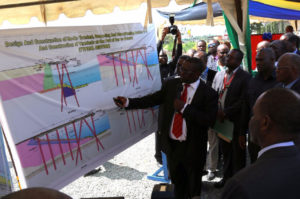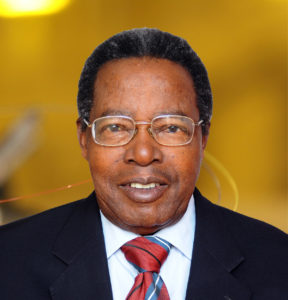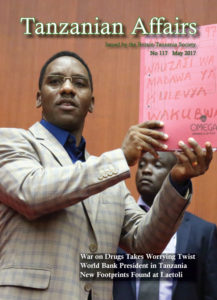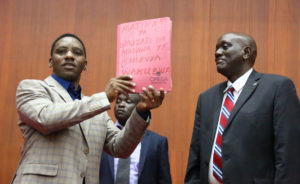by Martin Walsh
THE DELUSION OF KNOWLEDGE TRANSFER: THE IMPACT OF FOREIGN AID EXPERTS ON POLICY-MAKING IN SOUTH AFRICA AND TANZANIA. Susanne Koch and Peter Weingart. African Minds, Cape Town, 2016. xii + 384 pp. (paperback). ISBN 978-1-928331-39-1. £40.00.
The aid industry has come under increasing attack in recent years. Indeed, use of the word ‘industry’ in this context already carries pejorative overtones. At first, large insufficiently supported capital projects were the main targets, leading to an increasing emphasis on technical support. In this book, however, the argument is that the latter is also inherently flawed. Are we to conclude then that all attempts to bring assistance to developing countries, no matter how well intentioned, are doomed to failure?
In fact, the authors’ critique is more narrowly focused. Their particular concern is the failure of expert advice to foster ‘the national capacity for self-reliance’. Rather, they argue, ‘the persistent interference by outside actors in our view undermines the development of young into strong democracies as it puts governments at risk of losing control over their own policy agendas (p. 2)’. Related to this, ‘we take it to be a core aspect of sovereignty that states govern themselves and define their own policies (p. 6)’ – shades of Brexit here! A sceptic might object that this rather purist position insufficiently recognises the possibility of governments (not just in developing countries) adopting and pursuing wrong-headed policies (think South Africa and AIDS during the Mbeki years) and that the democratic deficit in policy-making may be due as much to local institutional weaknesses as to over-influential foreign experts. Nevertheless, their ultimate conclusion that more should be done to harness local knowledge and to foster local institutions which can enable such knowledge to play a greater part in the policy process is well made.
In support of their thesis, the authors have carried out case studies in Tanzania and South Africa, covering policy development in education, health and forestry. These are fascinating and the extensive quotations from interviewees merit close study by anyone involved in technical assistance, whether as donors or recipients. In deference to TA readers, we focus here on the Tanzania cases.
In education, the conclusion is that the policy agenda in Tanzania has been ‘hi-jacked’ by the foreign experts involved in the Education Development Partners Group: ‘In a nutshell, the state of education governance in Tanzania could be sketched as follows: the need for foreign financing has legitimated an intense involvement of external actors in the policy space in which aid money has become the central preoccupation. The prevailing sentiment of being at the mercy of donors has paralysed leadership and administration which fails to set or refrains from articulating an agenda of its own.’ One consequence was over-enrolment in schools, beyond the available capacity of either buildings or teachers, leading to falling standards. In contrast, South Africa is found to have been more successful in exploiting outside expertise to create a local vision. This is attributed to: lesser financial dependence on donors; competition between donors, leading to greater responsiveness to local needs and priorities; the careful approach of the authorities towards advice and assistance; and participation of various local stakeholders to counterbalance influence from outside.
The story in health is somewhat different. A number of policy initiatives were taken in the 1990s to rescue Tanzania’s health services from the serious decline that had occurred under the structural adjustment policies of the 1980s. This culminated in most donors participating in a constructive ‘sector-wide approach’ with ‘basket funding’ under strong Tanzanian leadership. However, this benign arrangement was then disrupted by the entry of global health initiatives with massive financial backing, particularly in relation to HIV/AIDS. Up to this point, Tanzanian policy gave priority to prevention and mitigation measures. With hundreds of millions of dollars on offer, the Tanzanians had little option but to go along with the programmes and policies imposed by the Global Fund, PEPFAR and the Clinton Foundation, which emphasised treatment with antiretroviral drugs, despite practical difficulties in implementing such a policy. Moreover, one of the most problematic issues related to the entry of global health initiatives in Tanzania was that ‘they not only shifted the bulk of the HIV budget to treatment but also skewed the overall resource allocation in health towards HIV/AIDS at the expense of other crucial areas and prevalent diseases (p. 249).’ In addition, ‘While the dialogue forums in health and HIV/ AIDS were actually established to reduce donor influence and induce a more distant form of advice, it de facto brought aid actors closer to decision-making insofar as it entrenched their participation in policy development, analysis and evaluation (p. 257)’. Meanwhile, South Africa was more successful in harnessing outside finance and advice in support of its own agenda (at least, once Aaron Motsoaledi had become Health Minister).
The third case covered environmental policy, particularly forestry. Here external advice played a large part in mainstreaming environmental policy in Tanzania and helping to secure passage of the Forest Act (2002) and the Environmental Management Act (2004), which was regarded as a model of its kind. However, disillusion soon set in. A combination of low priority for environmental actions in budget setting, misappropriation of funds and insufficient administrative capacity resulted in a situation where ‘environmental policies and legislation are hardly put into practice (p. 290)’. In response, donor support either faded away or was redirected into the new international enthusiasm for REDD+ (Reducing Emissions from Deforestation and Forest Degradation). Again, South Africa did better, thanks mainly to strong local expertise.
The concluding chapters of the book review the relative importance of financial strength, administrative capacity and the local knowledge base in the light of the case studies. They find that ‘it is insufficient to explain external influence on policy-making with a single factor.’ The final chapter heading nevertheless is ‘There is no substitute for local knowledge’ and the authors make suggestions to strengthen its influence. Evidently this cannot be a quick fix, leaving open the question how donors and recipients are supposed to work constructively together in the meantime. The case studies do however offer some pointers as to how the more egregious practices can be avoided. For those keen to learn more, the book includes a very full bibliography.
Hugh Wenban-Smith
Hugh Wenban-Smith was born in Chunya and went to Mbeya School. His career was as a government economist (mainly in Britain, but with periods in Zambia and India). He is now an independent research economist, with particular interests in infrastructure, urbanisation and transport.
THE ENDURING RELEVANCE OF WALTER RODNEY’S ‘HOW EUROPE UNDERDEVELOPED AFRICA’. Karim Hirji. Daraja Press, Montreal, 2017. 134 pp. (paperback). ISBN 978-0-9952223-9-7. £8.80.
Karim Hirji argues succinctly that Walter Rodney’s inspirational book, How Europe Underdeveloped Africa (HEUA), retains its long-term relevance because it articulates a strategy for the total economic independence of Africa as well as the emancipation of Africa and its people. Hirji knew Rodney personally and he explains that as the struggles for independence matured, a Marxist strand of political economy which demonstrated that Europe has an exploitative relationship with Africa emerged. Rodney was not a mechanical borrower of ideas from other progressives. He was a critical scholar and classical Marxist whose theoretical framework of analysis was based on Marxist political economy.
From the 15th century onwards African societies came under the hegemony of western imperialism, and colonial policies prevented genuine capitalist development. Rodney thought that the African masses must take the control of state power, disengage from the global capitalist system, adopt socialism, and use its wealth to develop society. He proposed a strategy of integrated economic development for the liberation of African nations, but his book became a target for elitist right-wing intellectuals for its anti-imperialist stance. Its content, methods and conclusions were scrutinised by many, including some progressive academics. Because Rodney advanced the Marxist idea that economic factors are the primary motor of African history, he is accused of economic determinism by conventional historians who fail to see anything wrong with the cultural and demographic determinism that they adopt in their own analyses.
Another criticism of Rodney’s book is its explanation of the role played by external factors in the transformation of Africa during the slave trade and after. Rodney understood capitalism as a global system and imperialism as an economically-driven phenomenon facilitating the extraction of surplus, and so the underdevelopment of Africa. However, some African and Western scholars argue that Rodney’s thesis is not relevant for the postcolonial period, and that poverty in Africa cannot be attributed to imperialism but instead must be blamed on corrupt leadership. Their proposed solution is the adoption of neoliberal policies with economic liberalisation and the promotion of foreign investment. As Hirji points out, this is an approach that merely pretends to scientific objectivity.
Rodney wrote about a continent that had been exploited for centuries. His work had to be exceptional because he was breaking the silence that had been maintained by academia itself. And in order to expose the truth of Africa’s underdevelopment he brought in new ideas and adopted a unique style. Rodney was a committed Marxist scholar and activist who continually enhanced his perspective through study and struggle. While engaging with local realities on ‘The Hill’, his views evolved. By the mid-1970s he had realised that the rhetoric of Tanzanian socialism masked the neocolonial dependency being implemented in the country.
He mingled with both intellectuals and the masses. I first met Rodney during his lecture on the Cuban Revolution at the University of Dar es Salaam. He was a very powerful orator and captivated the academic audience. Together with Hirji, Issa Shivji and other comrades, we went with him to the Ujamaa villages in Bagamoyo and Dodoma to work with the peasants. Personally, I treasure the few days that I spent with him when he had fallen sick while on his way to Njombe with his wife Pat and children, Asha, Shaka and Kanini. He stopped over at our humble home in Mzumbe, Morogoro, and my wife Salha and I were able to spend a few days with him and his family while he recuperated.
Hirji points out that the main theme of HEUA remains as relevant for Africa today as it did in 1972 when it was first published. The book enables one to understand the continent’s past and the path it is taking, as well as the grave social economic problems that Africa has faced. The result was a ground-breaking work of scholarship. For the first time the real causes of underdevelopment in Africa were exposed, and Rodney’s book was widely read in Africa and the Caribbean.
Today, however, there are conscious efforts in some quarters to disqualify Rodney’s thesis. Indeed, most historians now studying African history hardly ever make reference to him. Even in the university seminar rooms, HEUA seems to be completely forgotten. Students rarely read a fair depiction of the contribution of Rodney’s Marxist approach: instead he is often misquoted. It is therefore timely for Hirji to remind us of his magisterial work. He discusses Rodney as a humane revolutionary and radical scholar who supported student activism and radical writing in the campuses of different universities. Despite determined attempts to silence Rodney, his inspiration to change the society for the better and fight for a just and non-racial future remains strong.
Georgios Hadjivayanis
Dr Georgios Hadjivayanis is a retired Associate Professor of Sociology and Social Anthropology. He did his undergraduate and postgraduate studies at the University of Dar es Salaam where he was actively involved in student politics. His memoir of that period is published in Cheche which was edited by Karim Hirji. He did his doctoral studies at Pantheon Sorbonne in France. He was one the founding Directors of Haki Ardhi, and taught at Mzumbe and Sokoine universities in Morogoro prior to moving to South Africa. He is currently based in London.
JOHN THOMAS MHINA SEPEKU, ASKOFU MKUU WA KWANZA, KANISA ANGLIKANA, TANZANIA. Augustino S.L.Ramadhani. Mkuki na Nyota, Dar es Salaam, 2017. 287 pp. (paperback). ISBN 978-9987-75-394-9. TSh. 25,000.
John Sepeku was one of the outstanding personalities in the first generation of church leaders following national independence. Born in Misozwe, Tanga, in 1908, he became first Anglican Bishop of Dar es Salaam in 1965, and first Archbishop of the Anglican Province of Tanzania in 1970. He was educated at St. Andrew’s College, Minaki, Kisarawe, one of the two best existing secondary schools. In his final year when Sepeku was Head Prefect, the Headmaster, Canon Gibbons, commented: “Has the courage of his convictions. Is a leader and has real ‘dini’ (that is, genuine religious faith). Cannot speak too highly of him.”
The author is himself an outstanding personality. Augustino Ramadhani was Chief Judge of Zanzibar from 1980-89, then Chief Judge of Tanzania from 2007-10, and finally President of Africa’s International Court of Human Rights. Before his retirement as judge in 2016, the author was ordained as an Anglican priest in Zanzibar in 2013. He knew John Sepeku very well, and this excellent biography has been written out of love and gratitude. It is now 34 years since Sepeku died. Inevitably there are a few gaps in the story, but the author has brilliantly succeeded in writing an extensive account of his life, by using a variety of written sources, as well as live interviews. As the author remarks, his book is more than a biography. It is also a brief history of the Anglican Church, tracing it back to the days of David Livingstone’s appeal, made to British and Irish universities in 1857, to send missionaries to rid Africa of the scourge of the slave trade, and to spread the light of Christianity. It was this historic appeal which led directly to the founding of the Universities’ Mission to Central Africa (UMCA), which in 1965 was incorporated in the United Society for the Propagation of the Gospel (USPG). John Sepeku was nurtured in this ecclesiastical tradition, but never restricted by it. He formed friendships across church boundaries, and both as bishop and archbishop sought to bring harmony and break down divisions.
In 1960 the Anglican Province of East Africa was inaugurated, bringing together for the first time the two different missionary traditions of the UMCA and the CMS (Church Missionary Society) into one autonomous body. When the diocese of Dar es Salaam was founded in 1965, Sepeku became its first bishop. From the start he welcomed and made provision for Christians from the evangelical ‘CMS’ dioceses, and co-operated closely with Gresford Chitemo, his neighbouring bishop in Morogoro. Then, in 1970, just two days before the nation celebrated its National Independence Day, the Church of the Province of Tanzania was inaugurated. John Sepeku was enthroned as its first archbishop, having been elected by his seven fellow bishops in Tanzania. Chosen by the Archbishop of Canterbury to preside at the closing Eucharist of the Lambeth Conference in 1978, he stepped down as archbishop in the same year, and continued as bishop until he died in 1983.
Often called the ‘farmer’ bishop because of his ‘hands-on’ commitment to developing diocesan land for horticulture, John Sepeku was also instrumental in providing urban land in the city for educational and social projects, such as the Kichwele Women’s Hostel for single girls, St. Mark’s Theological College, and a School for Deaf Children.
As archbishop, John Sepeku travelled widely throughout Tanzania, building on his knowledge of the different backgrounds and church traditions to bring about a sense of a genuinely indigenous Tanzanian church, diverse but essentially one.
A natural leader, who could be authoritarian and stern, John Sepeku was widely acknowledged to be at heart a humble pastor, compassionate and just, whose advice was sought not only by bishops and priests but also by government leaders. Judge Ramadhani has written a masterly book in which he brings out clearly the exceptional qualities of this great church leader. He has written a brief English synopsis. The book is now awaiting a full translation, but meanwhile it should be recommended reading for all current and aspiring leaders of church and state.
Graeme Watson
Revd Graeme Watson worked as a missionary priest and teacher in Tanzania from 1967 to 1977. He was Tutor at St. Cyprian’s College, Lindi, 1967-77; Vice-Principal of St. Mark’s Theological College, Dar es Salaam, 1969-73; and Rector of St. Alban’s Church, Dar es Salaam, 1974- 77.





